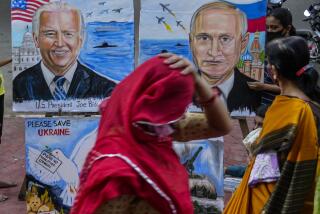A peace built by nukes and cash
- Share via
The bush foreign policy squad hasn’t had much to cheer about lately. The Iraqi insurgency won’t die. Iran is suspected of seeking nuclear weapons. North Korea already appears to have acquired a small stash. But as the president met with Indian Prime Minister Manmohan Singh on Monday, the White House could take heart from what’s happening in South Asia.
For starters, nuclear weapons have promoted peace in that volatile region, it turns out.
When India and Pakistan went nuclear in 1998, most people in the West believed that South Asia had become a more dangerous place. That was a gloomy assessment, considering that the subcontinent had seen full-scale war between India and Pakistan, intermittent skirmishes and terrorist attacks.
But now South Asia is more stable than it was a decade ago, and the prospects for a settlement of the competing claims to Kashmir are better, arguably, than they have ever been.
What accounts for the turnaround?
As was true for the Soviet Union and the United States, nuclear weapons magnify the risk of conflict and thereby concentrate the minds of leaders. The danger that a crisis could escalate and bring nuclear weapons into play is not an academic abstraction, it’s a reality. Which is why India and Pakistan have been building mutual trust since 1998. Occasionally, they’ve approached the line of conflict, but they have taken care not to cross it.
After the attack on the Indian parliament by Kashmiri terrorists in late 2001, India massed troops on the border with Pakistan but stopped short of firing and eventually disengaged. And even under a hawkish Indian government, leaders from both countries met (Pakistani President Pervez Musharraf visited India, his birthplace; India’s foreign minister went to Islamabad) to promote political dialogue, cultural exchanges and trade.
Both countries have also been trying to cut the Gordian knot on Kashmir by jettisoning shopworn, intractable positions. Musharraf has put forward some tantalizing ideas. The specifics remain hazy, but he seems ready to drop Pakistan’s traditional demands, including an internationally supervised plebiscite to determine the region’s future.
India’s leaders have refused to be rushed by Musharraf’s warning that there is a brief window for making dramatic progress on Kashmir, but they too have tried to maintain the momentum. They have allowed bus service to resume between the Indian and Pakistani parts of Kashmir, and a delegation of leaders from Indian-controlled Kashmir was permitted to travel to Pakistan-held Kashmir for talks.
As important has been India’s overhaul of its perspective on Pakistan. For half a century, the Pakistan-India partition has been considered a challenge to India’s reason for being. As India won its independence from Britain, the subcontinent’s Muslims feared they would become second-class citizens among the Hindu majority. The creation of Pakistan in effect denied India’s claim to being a secular democracy in which all citizens, regardless of ethnic or religious background, could enjoy equal rights.
Successive Indian governments therefore believed that Pakistan’s disintegration would not be a bad thing. In 1971, civil war erupted in Pakistan, India intervened militarily and Bangladesh rose from the debris. Pakistan’s dismemberment was wildly popular among Indians.
But now Indian leaders see that the unraveling of a nuclear Pakistan would be disastrous for India’s security. Given the strength of fundamentalism in Pakistan, an upheaval could bring nuclear-armed Islamic hard-liners to power.
And it’s not just India’s security that is threatened, but its newfound economic power. Since the early 1990s, India has pared down labyrinthine regulations, privatized unprofitable state-owned industries, lowered tariffs and welcomed foreign investment. Once derided for its “Hindu rate of growth,” India has become one of the world’s fastest-growing economies and a prime destination for foreign investment. Its information-technology firms are world-class, and American firms are outsourcing work to India’s hardworking, technically proficient, English-speaking college graduates.
All of this only bolsters India’s growing acceptance of Pakistan. War with the Muslim nation, or upheavals there, could derail the economic advance of its neighbor. Foreign investors, currency markets, bankers and traders dislike chaos. Serious unrest or a fundamentalist takeover in Islamabad could put a stop to projects like the planned gas pipeline from Iran to India via Pakistan.
India’s success is now tied to Pakistan’s. That’s good news for South Asia, and one fewer global hot spot is good news for President Bush and the U.S. too.
More to Read
Sign up for Essential California
The most important California stories and recommendations in your inbox every morning.
You may occasionally receive promotional content from the Los Angeles Times.













